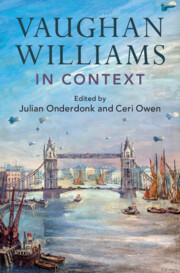Book contents
- Vaughan Williams in Context
- Composers in Context
- Vaughan Williams in Context
- Copyright page
- Dedication
- Contents
- Illustrations
- Graphs and Tables
- Musical Examples
- Notes on Contributors
- Acknowledgements
- Editorial Note
- Bibliographic Abbreviations
- Introduction
- Part I Biography, People, Places
- Part II Inspiration and Expression
- Part III Culture and Society
- Chapter 12 Politics
- Chapter 13 Liberalism and Landscape
- Chapter 14 The English Folk Revival
- Chapter 15 Christian Socialism and The English Hymnal
- Chapter 16 Pageantry
- Chapter 17 History and the Spirit of Revivalism
- Chapter 18 War
- Part IV Arts
- Part V Institutions
- Part VI Reception
- Further Reading
- Index of Works
- General Index
Chapter 16 - Pageantry
from Part III - Culture and Society
Published online by Cambridge University Press: 28 March 2024
- Vaughan Williams in Context
- Composers in Context
- Vaughan Williams in Context
- Copyright page
- Dedication
- Contents
- Illustrations
- Graphs and Tables
- Musical Examples
- Notes on Contributors
- Acknowledgements
- Editorial Note
- Bibliographic Abbreviations
- Introduction
- Part I Biography, People, Places
- Part II Inspiration and Expression
- Part III Culture and Society
- Chapter 12 Politics
- Chapter 13 Liberalism and Landscape
- Chapter 14 The English Folk Revival
- Chapter 15 Christian Socialism and The English Hymnal
- Chapter 16 Pageantry
- Chapter 17 History and the Spirit of Revivalism
- Chapter 18 War
- Part IV Arts
- Part V Institutions
- Part VI Reception
- Further Reading
- Index of Works
- General Index
Summary
Many thousands of historical pageants were held in twentieth-century Britain. These musical-dramatic re-enactments of history were especially popular in the interwar period, and in the 1930s Ralph Vaughan Williams collaborated with the novelist E. M. Forster to create two such pageants: The Abinger Pageant (1934) and England’s Pleasant Land (1938). Drawing on a range of published and archival sources, this chapter challenges readings of these and other pageants as expressions of a reactionary and conservative artistic (anti-) modernism. It sets them in the context of Vaughan Williams’s involvement with the Folk Revival, and his conception of folk culture as of vital relevance to contemporary society and its problems. It argues that these amateur performances of local history should be seen as realizations of Vaughan Williams’s ideals for a national culture which rested on the revival of local communities through art that was made by those selfsame communities. Vaughan Williams’s historical pageants were consistent with his left-leaning reading of English history, and with his belief in the radical potential of art – and specifically art that drew on an autochthonous vernacular musical tradition – to enrich human experience in the here and now, and on into the future.
Keywords
- Type
- Chapter
- Information
- Vaughan Williams in Context , pp. 135 - 142Publisher: Cambridge University PressPrint publication year: 2024

